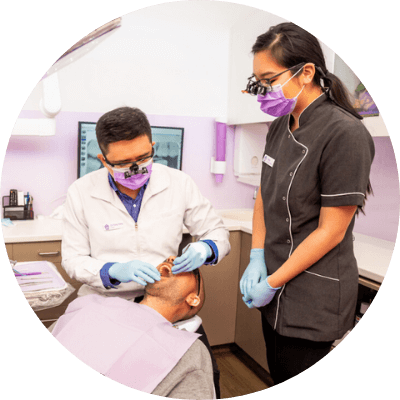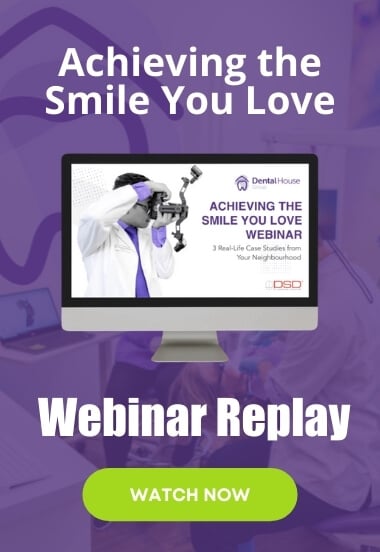Dental Phobia: Can You Talk Yourself Out Of It?
Dental Phobia: Can You Talk Yourself Out Of It?

Dental anxiety (DA) is considered a universal phenomenon. DA and pain are the most common causes of medical emergencies in the dental office; so prevention is an essential part of patient safety, and quality care.
Because dental anxiety and its consequences are closely related to the fight-or-flight reaction, it’s reasonable to argue that the odyssey of DA began in the distant past.
According to the fight-or-flight theory, our first reaction to perceiving danger involves a sympathetic activation that can be regarded as an acute stress response. It involves several organs and systems: the central and peripheral nervous system, the cardiovascular, the endocrine and immune systems, and muscle response. Fear yields specific physiological and psychosomatic changes via the release of several chemicals and the firing of neurotransmitters.
This resulting neuro-immune-endocrine storm triggers an increase in blood pressure, heart and respiratory rates, in order to provide sufficient blood supply to the heart, brain, lungs, and muscles – all needed in either fighting, or fleeing.
It’s a situation experienced by patients in the dental chair when they feel threatened: and as dramatic as it sounds, the dentist resembles the enemy or predator and the state of extreme vulnerability.
Pain is subjective. It’s a matter of experience and emotion; most research clinical practice focuses on analgesics and anaesthetics.
This understates the nature of it, and overlooks the patient’s choices and role in its management.
In short, pain is a matter of experience. It’s a subjective psychological state, that doesn’t necessarily have a detectable organic cause. It’s a complex functional phenomenon that depends on a profusion of factors that can be classified in various ways: acute, chronic, incidental, procedural, etc. The procedural pain perceived by patients undergoing dental procedures is a common cause of this anxiety, stress, and fight-or-flight reaction.
Pain and anxiety are partners with the potential of a vicious circle.
There is widespread evidence of self-medication in animals, ingesting to excess foods with mind-altering properties. Reindeer enjoy the hallucinogenic mushroom Amanita muscaria or fly agaric, which has them behave as if drunk, and then fall asleep. On waking, they will often urinate and devour the soaked snow to perpetuate the intoxication.
Our ancestors observed and mimicked wild and domesticated animals to help identify herbal remedies and nutrient rich foods. Both chimpanzees and humans in sub-Saharan Africa are known to ingest the bitter pith of Vernonia amygdalina or bitter leaf to control intestinal roundworm infections.
Siberian shamans of the Chukchee, Koryak and Kamchadal people have since ancient times, used this fungus to induce trance and ecstasy states in order to communicate with the supernatural, divine the weather, and to diagnose and treat disease – including psychological and psychosomatic disorders.
In ancient Egypt and Greece, along with knowledge of medicinal plants and the development of surgical procedures, came the use of incubation, a healing technique regarded as the antecedent of modern hypnosis. Incubation was a healing technique where patients were incubated for a night, during which they were induced to dream of a god, who gave them advice and instructions on how to recover from their illness.
Descartes’ radical dualism of splitting the soul and the body, modern medicine devoted itself to the cure of the earthen machine only: disregarding consciousness and understating the Hippocrates’ teaching of the whole. Hypnosis was misunderstood and rejected as absurd and irrelevant.
Over the past two decades the relevance of psychology and behavioural sciences in dental education and clinical practice has progressively increased. For the most part oral intervention is stressful, causing an increase of anxiety, with the expectation of suffering and pain, often resulting in bad oral health, due to delaying or avoiding treatments. Dental anxiety and dental phobia make the dentist’s job harder and more stressful: a fact leading to the idea, and perhaps myth, of a high suicide rate among dentists.

It is time to reappraise and rediscover the holistic teaching of Hippocrates; to rebuild a patient-centric approach and an effective doctor-patient relationship, focused on the “to care” instead of the “to cure”. Hippocrates taught, “It is more important to know what sort of person has a disease than to know what sort of disease a person has”.
So how is any of this relevant? Because fear stems from lack of knowledge and understanding, a sense of powerlessness and the perception of limited options.
Dental anxiety has a wide range of causes, and its management is far from simply being a matter of identifying the ideal sedative drug. Proper management includes assessing the anxiety, ensuring good communication, and providing information. Any weak link in this chain can cause avoidable suffering, mistrust, and emergencies.
There is a crucial role played by health professionals in the pathophysiology of DA, and patients can address the feelings they have of being unbearably helpless.
It’s an understatement to say that dentists and dental hygienists work in very close proximity to you. They are constantly in your “personal space”: current estimates have almost 25% of people worldwide affected by dental anxiety.
Research published by the University of Adelaide has Australians at 5% of its 25.5 million population: that’s well over a million petrified people.
Clinicians understand how difficult it is for patients with phobias and work with them to overcome their fear. They actively encourage ‘healthy patient visits’ for patients to familiarise themselves with routine dental surgery sounds and smells. These non-invasive visits are important in alleviating and addressing fear in patients.
With patients who have had a ‘bad experience’, it is important that the clinician finds out what happened, takes the time, and explains what’s going on and what needs to be done in simple terms.
Personal responsibility can be taken for that “dreaded” dental appointment: most important is choosing the right dentist.
This can take some time; so recommendations from friends and family are highly useful.
If you’re anxious about seeing the dentist, here are some tips to ease the fear:
Once you’ve found the dentist most suitable for you, visit the surgery to have a look around. Meet the team; see the environment. Tell the dentist about your fears and know that they’re on your side in finding the best strategies and solutions for you.
Make the appointment for your procedure early in the morning, so you have less time to dwell on it.
Take a friend with you. Your dentist won’t mind if they accompany you through the treatment.
Decide with your dentist on a signal that you need a break, and want them to stop. It can be as simple as pointing your finger, and you feel much more in control.
Often it helps to start gradually. Book in for a clean and polish, and work up to other treatments when you’ve built trust and rapport with your dentist.
Request a numbing gel if you have a fear of needles, and use headphones to listen to music that relaxes you.
Simple inhalation sedation is very helpful; you can also discuss using oral sedatives before your appointment.
If the required treatment makes you extremely nervous, there is the option of intravenous sedation that allows you to be fully awake and able to talk, but so calm and deeply relaxed you really won’t remember much of the process.
Being afraid of the fear is the worst part. Understand it as merely a sensation: break it down. What do you see in your mind; how does it feel in your body; what self-talk do you have going on. Basic Neuro Linguistic Programming techniques are highly useful in this deconstruction and removal of triggers, and the ability to change the state of mind that had felt so incredibly inflexible before.
Most of all, you are not alone, you are not a freak, and you do have the power to overcome this common fear. Simple breathing techniques and self-hypnosis make massive differences in being able to move through the ‘stuck state’ of anxiety. Best of all, the opportunity to improve and maintain your oral health is the greatest reward for the methods you’ve learned from the bravery you’ve shown.
DISCLAIMER:
The content has been made available for informational and educational purposes only. New Gisborne Dental House does not make any representation or warranties with respect to the accuracy, applicability, fitness, or completeness of the content.
The content is not intended to be a substitute for professional personal diagnosis or treatment. Always seek the advice of your dentist or another qualified health provider with any questions you may have regarding a dental or medical condition. Never disregard professional advice or delay seeking it because of something you have read or seen on the Site.













